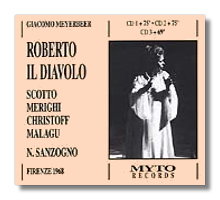
The Internet's Premier Classical Music Source
Related Links
- Latest Reviews
- More Reviews
-
By Composer
-
Collections
DVD & Blu-ray
Books
Concert Reviews
Articles/Interviews
Software
Audio
Search Amazon
Recommended Links
Site News
 CD Review
CD Review
Giacomo Meyerbeer

Roberto il Diavolo
Cast:
- Roberto, Duke of Normandy - Georgio Merighi, tenor
- Isabella, Princess of Sicily - Renata Scotto, soprano
- Bertramo - Boris Christoff, bass
- Rambaldo - Gianfranco Manganotti, tenor
- Alice - Stefania Malagù, mezzo-soprano
Maggio Musicale Fiorentino Orchestra & Chorus/Nino Sanzogno
Myto 002.206 3CDs Recorded May 1968
- Roberto, Duke of Normandy - Georgio Merighi, tenor
- Isabella, Princess of Sicily - Renata Scotto, soprano
- Bertramo - Boris Christoff, bass
- Rambaldo - Gianfranco Manganotti, tenor
- Alice - Stefania Malagù, mezzo-soprano
Myto 002.206 3CDs Recorded May 1968
Giacomo Meyerbeer (1791-1864), born Jakob Meyer Beer in Berlin, gave meaning to the phrase "grand opera." After success in Italy, he moved to Paris, where he turned out one after another hugely popular operas that were distinguished from "opéra-comique" not only by their use of musical rather than spoken dialogue but also by their grandiose stage effects and the opportunities they offered for spectacular vocal displays. But few composers declined in reputation as rapidly or were as severely criticized after their death. In 1841 Wagner wrote that Robert le Diable "has a wonderful, almost sinister atmosphere…it is deathless!", but later, in one of his anti-Semitic diatribes, he described Meyerbeer's style with wicked accuracy as "a monstrous motley, historico-romantic, sacro-frivolous, mysteriously brazen, sentimental-humbugging dramatic hotch-potch." True enough, but at the same time, Meyerbeer was a meticulous craftsman, vivid and imaginative in his use of voice and orchestra, with a sure dramatic sense – and given good performers and direction, his operas are great fun.
Robert le Diable was his first important Paris success (1831). The libretto, by his long-time collaborator Eugène Scribe, is a typically nonsensical amalgam of spurious 13th century history and the supernatural: the devil, pretending to be Bertram, friend of Robert the dissolute Duke of Normandy but actually his father, spends most of the five acts trying to seduce his son into signing away his soul, but is foiled by the goodness of Robert's foster-sister Alice, and the opera ends when the cathedral doors open revealing Robert's beloved Princess Isabella in her wedding gown. The high point of glorious absurdity is reached toward the end of Act II, when Bertram calls forth a bevy of dead nuns masquerading as maidens who lead an orgiastic dance in an effort to persuade Robert to steal an omnipotent cypress branch from the grave of St. Rosalie. But for all its apparent tomfoolery, the plot and the music move along quickly, with dramatic confrontations, romantic interludes, grand choruses, and spectacular stage effects effectively designed to dazzle audiences, then and now.
This recording gives us a heavily cut version (about an hour is missing) of Robert le Diable in Italian translation, from a performance at the 1968 Maggio Musicale in Florence. It has a splendid cast, all of whom sing out easily in a broad, Italianate way. Scotto has to force her voice a little at the top but she sings beautifully in the lower registers and delivers a nicely nuanced interpretation of her role. Merighi's tenor is almost baritonal in quality and has a clear and incisive ring, Christoff is appropriately dark and sinister as the devil incarnate, and best of all is the warm, rich mezzo of Stefania Malagù as Alice. Sanzogno's pace is a little slower than it should be, the chorus is somewhat ragged, the sound is not up to modern standards, the libretto is in Italisn only, but all in all, this is an useful and entertaining release. The set is rounded out by nine familiar arias gloriously sung in 1961 and 1962 by Christoff (three Mozart concert arias, the Catalog aria from Don Giovanni and "La calumnia" from Barber of Seville, and arias from Macbeth, Mefistofele, and Boris Godunov); they are all available in other recorded performances, but if you don't have them in your collection, they are good enough reason by themselves to be worth the price of admission.
Copyright © 1999, Alexander J. Morin


















